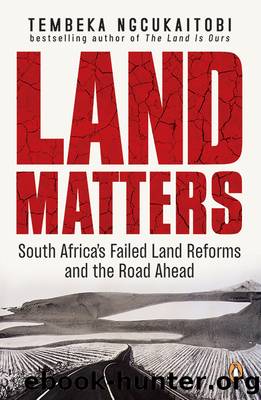Land Matters: South Africa's Failed Land Reforms and the Road Ahead by Tembeka Ngcukaitobi

Author:Tembeka Ngcukaitobi [Ngcukaitobi, Tembeka]
Language: eng
Format: epub
Tags: history, Africa, South, Republic of South Africa, political science, Public Policy, General
ISBN: 9781776095964
Google: -WhczgEACAAJ
Publisher: Penguin Random House South Africa
Published: 2021-06-04T23:31:51.375183+00:00
The future of the willing seller
So far we have considered the failed land redistribution programme. It has not failed because it is market-driven. It has failed despite its fundamental adherence to market-based solutions. A greater reliance on market âforcesâ simply lacks any credibility. Our fixation with market-based solutions has not produced the desired results.
The solution, however, is not to replace an imperfect market with equally imperfect state institutions. When Mike Mlengana, the most senior official at the Department of Agriculture, Land Reform and Rural Development, resigned from his position in 2020, Farmerâs Weekly reported that his reasons for resigning included
ongoing large-scale and widespread inefficiencies at all levels within the agriculture department; the departmentâs current structures and human capital not being geared for effective implementation of plans to develop and support South Africaâs agriculture sector; an âabsolute lack of delivery knowledge and work ethicâ at all levels within the agriculture department; and the departmentâs leadership often voicing the will to tackle corruption, but then failing to hold each other accountable for this.28
This view confirms what many commentators have said all along. In 2013 Cousins cited the âinability of land reform officials to engage in planning to support the productive use of transferred land, or to critically assess the plans drawn up for beneficiaries by consultantsâ as two of the key reasons for the overall failure in land reform.29 He asked if it was âcredible, then, that officials will be able to undertake the varied and technically complex tasks required of them by the new policiesâ. His answer was that they couldnât, at least in the short term. Yet he was not willing to allow for a wholly market-driven approach. This was because âmarket forces on their own tend to privilege the better-offâ. This is true, as only deliberate interventions in favour of the poor will ensure we have a land reform programme that fulfils its potential to help address poverty and inequality. For this to happen, however, we need a capable state guided by a commitment to ending structural injustice. To do this, the state must also combat corruption.
Download
This site does not store any files on its server. We only index and link to content provided by other sites. Please contact the content providers to delete copyright contents if any and email us, we'll remove relevant links or contents immediately.
Kathy Andrews Collection by Kathy Andrews(11798)
The remains of the day by Kazuo Ishiguro(8961)
Spare by Prince Harry The Duke of Sussex(5170)
Paper Towns by Green John(5168)
The Body: A Guide for Occupants by Bill Bryson(5067)
Industrial Automation from Scratch: A hands-on guide to using sensors, actuators, PLCs, HMIs, and SCADA to automate industrial processes by Olushola Akande(5042)
Machine Learning at Scale with H2O by Gregory Keys | David Whiting(4285)
Be in a Treehouse by Pete Nelson(4026)
Never by Ken Follett(3924)
Harry Potter and the Goblet Of Fire by J.K. Rowling(3837)
Goodbye Paradise(3794)
The Remains of the Day by Kazuo Ishiguro(3387)
Into Thin Air by Jon Krakauer(3375)
Fairy Tale by Stephen King(3361)
The Cellar by Natasha Preston(3327)
The Genius of Japanese Carpentry by Azby Brown(3281)
120 Days of Sodom by Marquis de Sade(3253)
Reminders of Him: A Novel by Colleen Hoover(3066)
Drawing Shortcuts: Developing Quick Drawing Skills Using Today's Technology by Leggitt Jim(3063)
